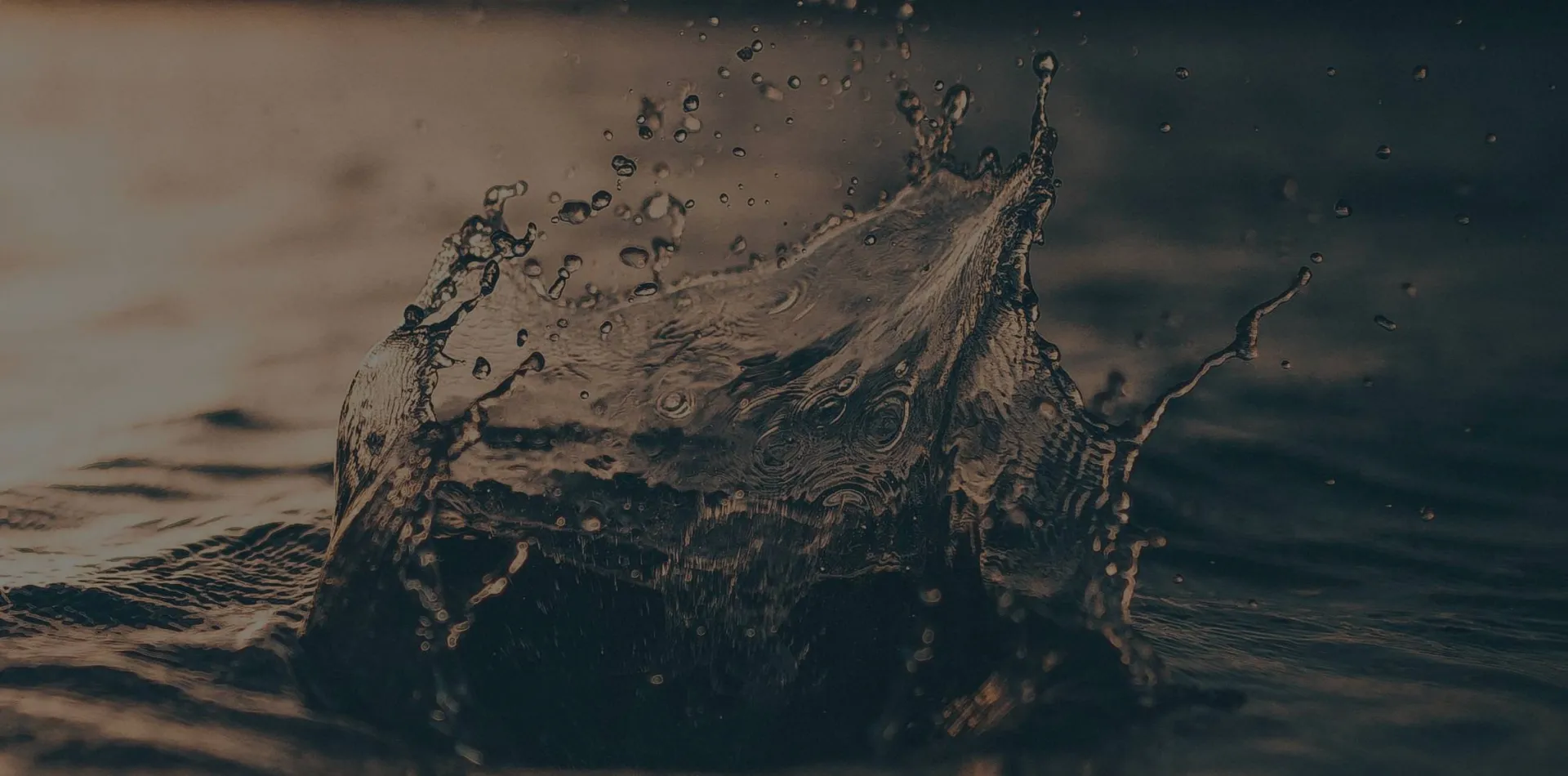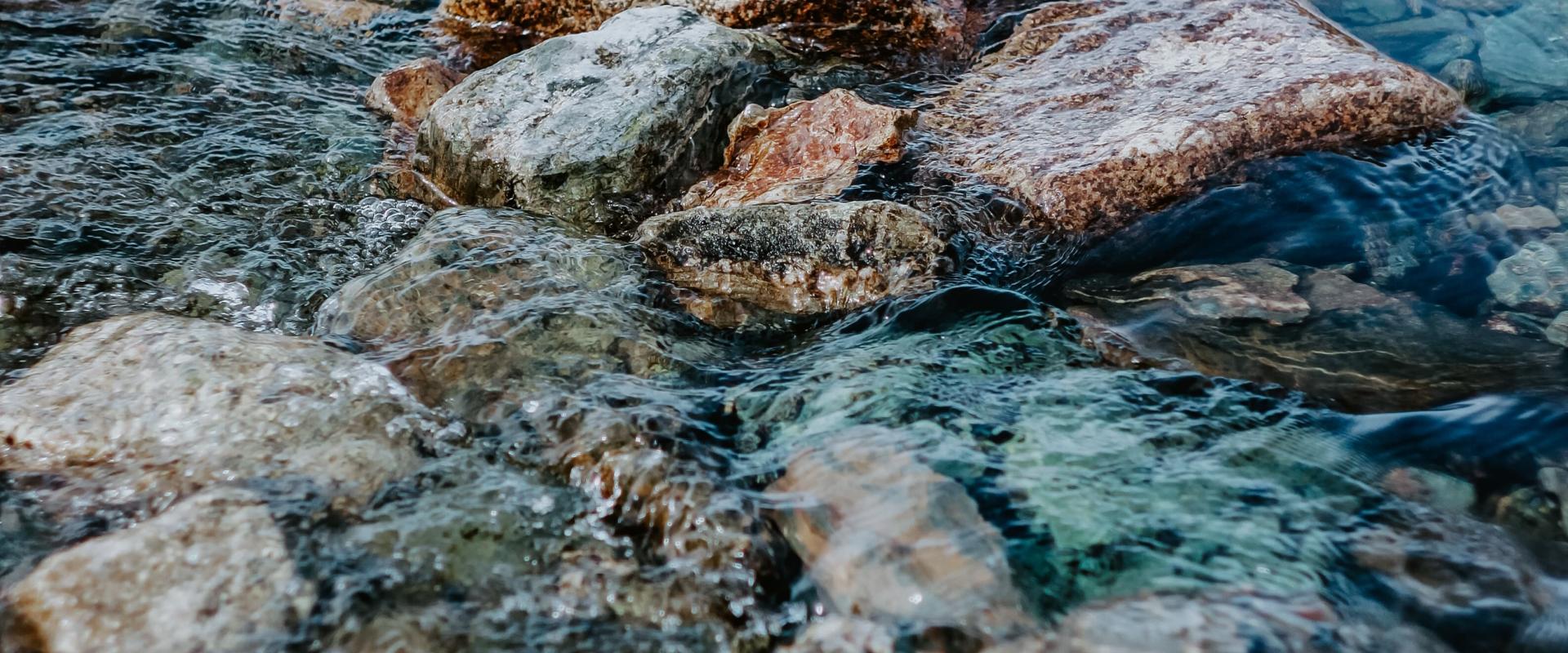Equipments supporting OneWater (PC1)
Targeted Project #1 (PC1) is designed to accompany all the scientific challenges, their main contributors, the targeted projects and their experimental areas, the observatories and the research infrastructures, so that they can fully focus on the scientific and technical issues at stake.
The knowledge required for OneWater means that additional data will have to be acquired. This in turn implies deploying new equipment, sensors and other measuring instruments to supplement the equipment already in use at a site, acquiring new measurements as part of a more systemic and global approach, running new experiments, installing information systems at new sites, adding to the existing equipment, innovating, and reviewing the solutions.
Improving past (20th century to present) and present hydroclimatic knowledge to better anticipate future changes (PC2)
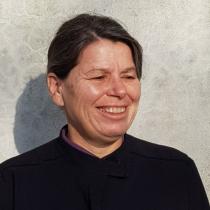
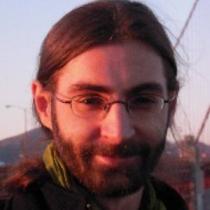
This project focuses on past estimates of water resources in France and their forecasting on a seasonal scale. The aim is to acquire a better understanding of the variability of water resources and the conditions under which intense phenomena occur, in order to better anticipate risk situations. To achieve this, the project will draw on several methods (direct and indirect observations, hydro(geo)logical modelling, weather forecasting models and assimilation methods) and will involve the scientific community in mainland France and the French overseas territories. Three main actions are targeted.
The first is developing a national lysimeter network to acquire information on rainfall distribution between evaporation, run-off and infiltration, and to characterize the dynamics of groundwater recharge. The second seeks to improve the historical meteorological re-analyses used to feed hydro(geo)logical models and reconstruct catchment area histories. This will enable the use of high-resolution meteorological models to gain a better understanding of hydrosystem behaviour. The third action aims to enhance the two existing seasonal hydro(geo)logical forecasting platforms dedicated to low-water flows in rivers and groundwater. This project should significantly further understanding of the processes that play a decisive role in the functioning of eco-hydrosystems in France, in particular groundwater recharge and the impact of water use. Reconstructions going back more than a century will help to better characterize current extreme events and improve the relevance of seasonal resource forecasting tools.
Learn more about Targeted Project 2
Experimenting and testing on site, especially in Living Labs (PC3)
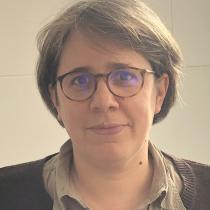
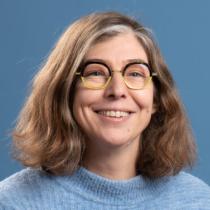
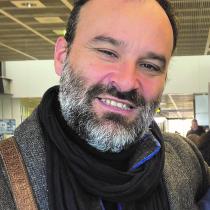
The aim of this targeted project is to use long-term observatories (such as Living Labs) in different geographical, geological, climatic and socio-economic contexts in France to (1) develop, test and validate the approaches, models, tools and experiments envisaged in each of the OneWater challenges, while encouraging the co-construction of multi-stakeholder approaches ; (2) ensure a territorial measurement network that meets the demands for research and monitoring of water resources and the ecosystems that depend on them, for the various water stakeholders and users ; (3) meet the challenges identified by OneWater, notably to serve as full-scale test areas for the paradigm shifts at stake with ad hoc partners and stakeholders.
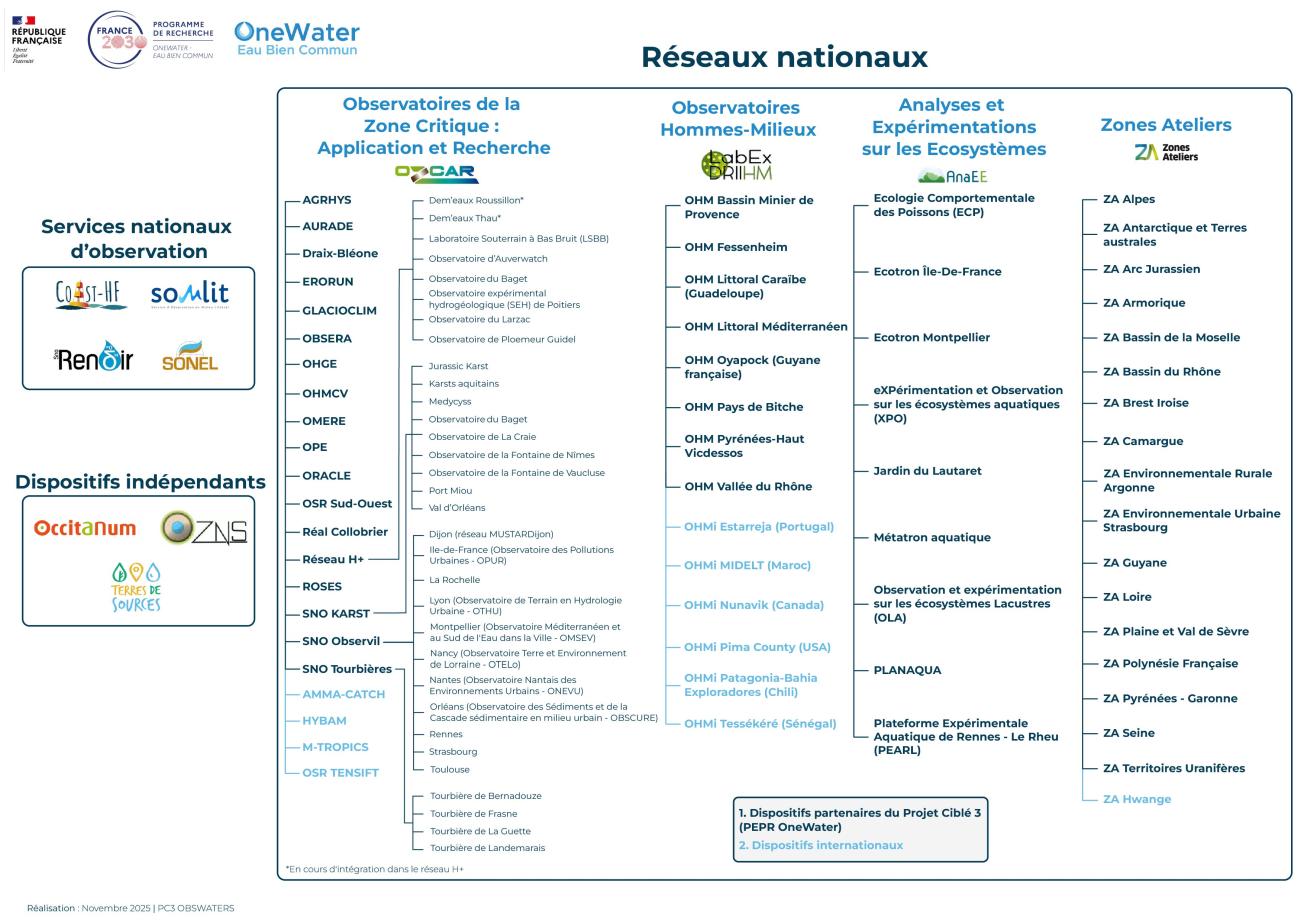
Using the water quantity/quality footprint concept (Challenge 2) to review the WFD monitoring network (PC4)
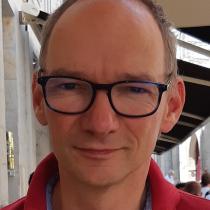
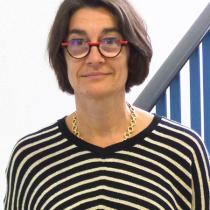
This project will consider the concept of the water footprint from more than just a quantitative perspective. It will incorporate multiple dimensions making it possible to link pressures on the resource (e.g. restrictions on flows, chemical inputs), impacts on water quality, environmental quality, ecosystem health and impacts on society and human health. The challenge is to go beyond correlative approaches and put forward a mechanistic procedure based on the transfer and responsiveness processes of biogeochemical elements and contaminants resulting from human activities, and their interactions with ecosystems. This should lead to a review of the approaches and metrics used in the context of the WFD.
The first of this PC’s three phases will develop the footprint concept in a collaborative process at the interface between the various scientific fields. It will then examine how it can be applied in the field and in the modelled systems. Phases 2 and 3 of the project will consist of applying the mechanistic concept of the all-encompassing water footprint put forward in Phase 1 at the study sites and then validating it, particularly in the context of the WFD. The study sites will include different anthropogenic and hydro-pedo-climatic contexts that are recognized as sensitive to global change.
Learn more about PC4
Examining the feasibility of an Aquatheque (PC5)
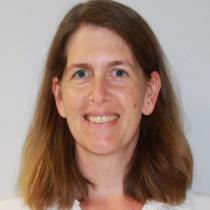
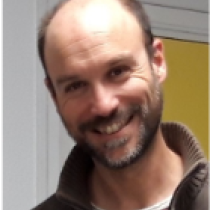
This targeted project will explore the possibility of introducing methods and procedures for collecting, recording, storing and providing access to water samples and their analyses for the various stakeholders in the water sector, but also for future generations. These samples could then be re-analysed at a later date using new chemical, physical, biological, biochemical or statistical methods. After analysing the existing approaches applied to environmental samples and testing the identified solutions in pilot laboratories, the project could draw up a set of specifications for a national "aquatheque" (or sample bank) with a long-term operating procedure, a viable economic model and a sustainable development approach. Sample and data banks can be powerful tools for assessing research measures and management/remediation policies aimed at anticipating the future impact of global change on socio-hydrosystems and ensuring the adaptability and resilience of socio-hydrosystems.
Testing solutions at demonstration sites (PC6)
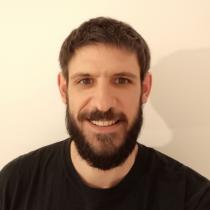
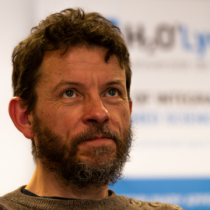
This targeted project will test solutions – which may be nature-based, technical/technological, based on a circular economy or relating to governance approaches – to promote the adaptability and resilience of socio-hydrosystems. Without wishing to speculate on their nature, it is now accepted that one of the major stumbling blocks to implementing these solutions will be the availability of robust tests of their effectiveness and environmental added value. The first phase will identify the most appropriate mechanisms (living labs, experimental platforms, sites, etc.) for testing the implementation of sustainable, equitable and viable solutions by applying the metrics, models and tools developed to facilitate their operational use and monitoring. The following phases will assess the possibilities for extrapolating/transferring these solutions to other areas while evaluating their limitations. Finally, a methodology will be developed to assess the successes and failures of the solutions in the OneWater approach.
En savoir plus sur le PC6
Accompanying socio-ecological transitions (PC7)
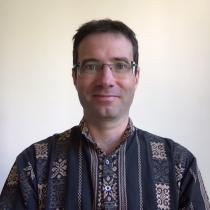
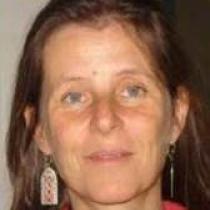
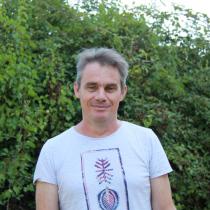
This targeted project seeks to foster the emergence of original approaches to water governance. This will be achieved by considering water in all its forms, uses, services and functions as part of a holistic, inter-basin, cross-border, intersectoral and comparative approach. The project will be based on the science of sustainability and the co-production of knowledge involving all stakeholders. The project has three objectives: (1) the creation of an epistemic community for water as a common good, consistent with the OneWater programme; (2) testing the principles that underpin the co-production of original approaches to the adaptive governance of water as a common good, with a view to developing governance tools for differing territories; and (3) the co-production of adaptation pathways for the viable development of social and hydrological systems, for the development of renewed public policies for water as a common.
Developing a OneWater Data platform (PC8)
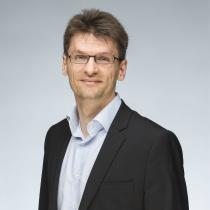
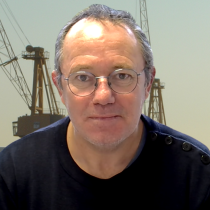
Today’s environmental and global issues require a shared body of knowledge based on the key variables and a community of practice for data exchange. This implies new means of storing data, new tools and interoperable data exchanges (FAIR data). It also entails innovative assessment, interpretation and forecasting technologies to transform this data into relevant information that can be used by every stakeholder. The transition from a disciplinary approach, responding to very specific objectives, to a systemic approach will call for initiatives to share data-related experiences (problems with interoperable exchanges, fragmentation, etc.) and for the continuous integration of new observation opportunities (problems of volume, heterogeneity, etc.). By building on existing initiatives and systems, the targeted project will endeavour to contribute to the discussions held at various levels and by various stakeholders on the many issues surrounding data, and where possible provide the means – or even potential solutions – to encourage access to and the sharing of water data and to meet the challenges posed by OneWater. It will be based on best practices and international standards (OGC, W3C, RDA, INSPIRE, etc.) and will help to develop these, where necessary. There are significant requirements, particularly given the diversity of data types, processing methods (including codes and models) and production sources.
